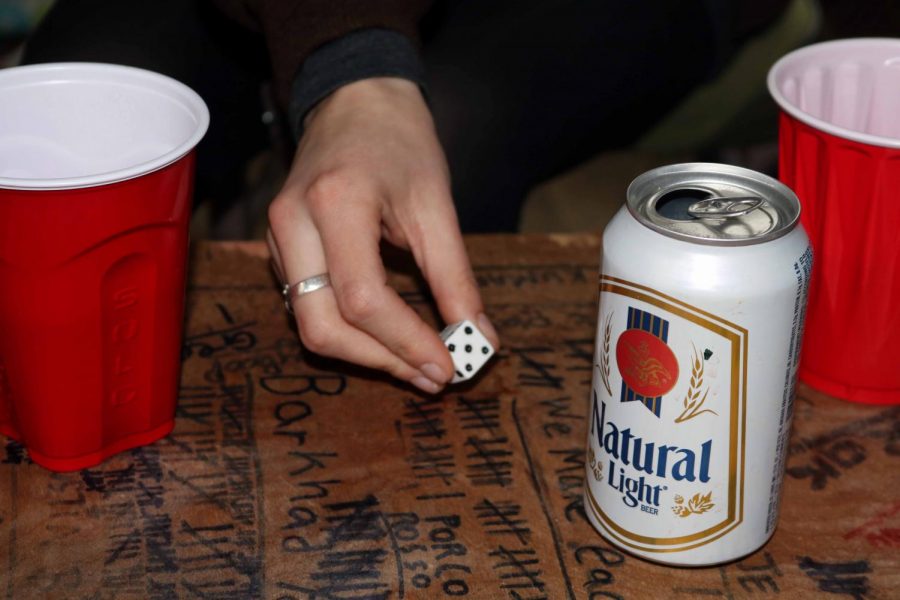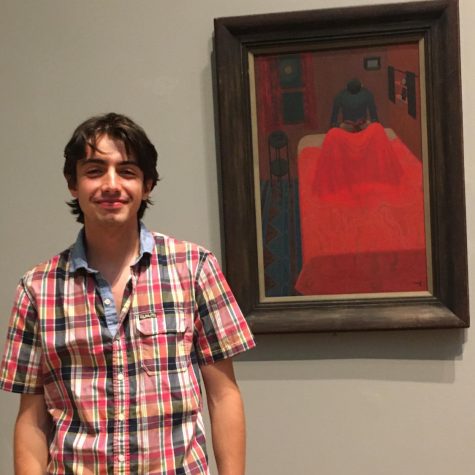Biz-ness as usual, Die League kicks off another season
Beer die has become a fixture of Grinnell College culture. For its players, the number between four and six, known only as “biz,” is sacred. Photo-illustration.
February 12, 2023
It’s that time of year again. No, not for Groundhog Day, Valentine’s Day or the Super Bowl. As the spring 2023 semester kicks off, so too does competition in Grinnell students’s annual Die League.
Beer die, a popular drinking game at colleges nationwide, has become a fixture of campus culture at Grinnell. According to Oliver Palmer `24, the league co-commissioner, the game fosters a spirit of camaraderie among students.
“It’s shaped my experience here for the better,” Palmer said. “Die has allowed me to meet a lot of people who I wouldn’t have otherwise met, and I think the friendly yet competitive environment brings you closer than if you were to just sit down with someone over a meal. You’re still sitting at a table regardless, but something about it just brings out the best in people.”
Fellow co-commissioner Moze Thurmgreene `23 emphasized how important it is that the game is inclusive of everyone on campus. “Everyone plays no matter if you play sports or don’t play sports — whatever kind of social group you’re in, it’s like a universal thing,” he said. “Die League brings people from all walks of life at the college together.”
However, the game remains strongly associated with the athletic teams at Grinnell, and both Palmer and Thurmgreene were introduced to it in that context. “I got involved through the tennis team,” Palmer said. “I went to their house off campus and they were playing a lot. It’s really essential to tennis culture here.”
Similarly, Thurmgreene said that, “on the basketball team, it’s part of our culture. My first year, when I got here, I saw the guys playing and that’s how I started playing die at Grinnell.”
Like any other collegiate athletic endeavor, Die League maintains a spirit of healthy competition. “A lot of athletes from men’s and women’s teams participate, and we’re just naturally competitive,” Thurmgreene said.
“It feels like a real sport,” Palmer said. “There are some teams who are just in it for fun, but for the most part, everyone takes it pretty seriously,” he continued.
Despite the at-times fiery competition, Palmer said that ultimately everyone who participates does so because the sport promises a fun time, evidenced by teams’s creative and humorous names. “There can be some funny ones,” he said. “A personal favorite is my team’s name, the Nut Hole Butters. I also like Lucky Lefties. Some people like to play on words using the term ‘biz,’” referencing the die-specific terminology for the number between four and six.
Played every year for more than a decade, according to Thurmgreene, Die League has a rich history at Grinnell. Over the years, rivalries have developed and certain groups have come to be recognized for their prowess in the game. Palmer said that the most capable teams have historically been associated with the swim and dive, tennis and basketball teams or the South Asian Student Organization. “At one point I would say the biggest rivalry was between tennis and swim, but this year the swim team doesn’t have any good die teams,” he said.
Now, both commissioners are looking forward to the rivalry between the tennis and basketball teams this season. “We want to beat each other,” Palmer said. “We definitely each think our teams are best.” Thurmgreene agreed but emphasized the fact that ultimately, the rivalry is a friendly one.
Palmer and Thurmgreene also highlighted a need to avoid repeating the controversy of last season, when a team of Bowen Mince `22 and Lili Pangborn `22, both league commissioners and both associated with the tennis team, claimed the Die League Crown.
“I think a lot of people had an issue with that,” Thurmgreene said. “I definitely thought it was controversial.” Palmer disagreed, however, saying that “there was some drama, but I don’t think the controversy was well-founded.”
Looking forward to the upcoming season, Thurmgreene said that he hopes to run a fair league that everyone can enjoy. “We’re trying to improve the culture by keeping it as open as possible,” Palmer said, emphasizing how he and Thurmgreene want to make the game accessible for everyone, regardless of how much experience people have or whether they want to drink or not.
“I really just want to make sure the tradition lives on,” said Moze. “I think it’s so cool to be a part of this, and hopefully I can come back to Grinnell in 5 or 10 years as an alumni and see die league still going strong.”
Editor’s note: Oliver Palmer is a staff writer for the S&B. He was not involved in the writing or editing of this article.



















































